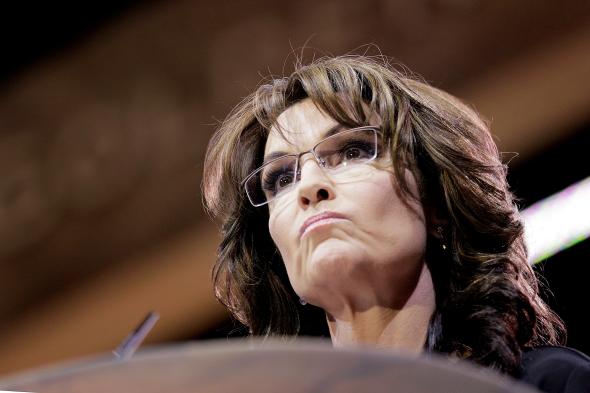Sarah Palin, Paul Ryan, and the Clash of Cynicisms

Photo by T.J. Kirkpatrick/Getty Images
On April 1 once and future reality show host Sarah Palin took to the pastures of Facebook to condemn the 2014 House Republican budget.
The latest Ryan (R, Wisconsin) Budget is not an April Fool’s joke. But it really IS a joke because it is STILL not seeing the problem; it STILL is not proposing reining in wasteful government overspending TODAY, instead of speculating years out that some future Congress and White House may possibly, hopefully, eh-who-knows, take responsibility for today’s budgetary selfishness and shortsightedness to do so. THIS is the definition of insanity. Do we still not understand how dangerous it is to allow government to grow unchecked as we shackle ourselves with massive debt – a good portion of which is held by foreign nations who don’t necessarily like us? If we can’t balance the budget today, what on earth makes us think it will happen at some future date?
In December 2010, after the Republican takeover of the House, the same Sarah Palin perused Ryan's old "roadmap" and found it worthy.
[T]hese reforms help to secure our entitlement programs for the 21st century. According to the Congressional Budget Office (CBO), the Roadmap would lead to lower deficits and a much lower federal debt. The CBO estimates that under current spending plans, our federal debt would rise to 87% of GDP by 2020, to 223% by 2040, and to 433% by 2060. Under Rep. Ryan's Roadmap, the CBO estimates that debt would rise much more slowly, peaking at 99% in 2040 and then dropping back to 77% by 2060.
Put simply: Our country is on the path toward bankruptcy. We must turn around before it's too late, and the Roadmap offers a clear plan for doing so.
The discrepency was noticed first by Peter Wehner, a conservative who has carried on a half-decade war of accountability against Palin, boiling her public statements down to an essential anti-intellectualism. "The plan Palin supported in 2010 would have taken over 30 years to balance the budget," he writes. "The plan she now opposes for not being sufficiently austere would balance the budget in ten years."
It does seem awfully cycnical, but I think what we have here is a clash of cynicisms. The 2010 Ryan roadmap proposed, as Palin wrote then, a partial privatization of Social Security. None of his budgets, as chairman, has included that. The budget documents proposed by Ryan do not get into the specifics of what discretionary spending would have to be cut. Ryan's become broadly more serious about cuts, but gradually less specific. Palin's become further detatched from the Republican consultant class (compare the prose in her Facebook posts to the prose in her op-eds), and ever more connected to a base that does not believe its representation in Congress is serious—but is fine voting to re-elect it.
Both sides of the argument have lost clout since 2010 and 2011. In the latter year, Newt Gingrich almost destroyed his presidential campaign (before voters found other means with which to destroy it) by calling that year's Ryan budget "right-wing social engineering." A base that had been told to adore Ryan reacted angrily. Now, Palin can criticize Ryan and the base does not move. The establishment does.
